【精品同步】2018-2019学年年人教版九年级英语全册教案★★Unit14IremembermeetingallofyouinGrade7
- 格式:doc
- 大小:106.50 KB
- 文档页数:5
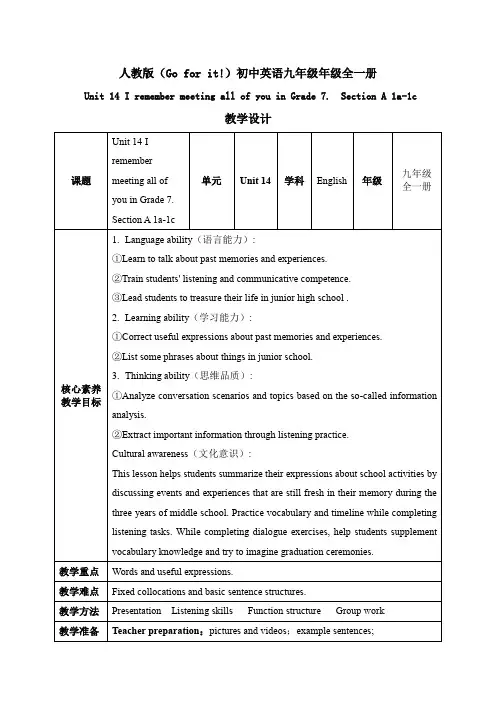
人教版(Go for it!)初中英语九年级年级全一册Unit 14 I remember meeting all of you in Grade 7. Section A 1a-1c教学设计课题Unit 14 Iremembermeeting all ofyou in Grade 7.Section A 1a-1c单元Unit 14学科English年级九年级全一册核心素养教学目标nguage ability(语言能力):①Learn to talk about past memories and experiences.②Train students' listening and communicative competence.③Lead students to treasure their life in junior high school .2.Learning ability(学习能力):①Correct useful expressions about past memories and experiences.②List some phrases about things in junior school.3.Thinking ability(思维品质):①Analyze conversation scenarios and topics based on the so-called information analysis.②Extract important information through listening practice.Cultural awareness(文化意识):This lesson helps students summarize their expressions about school activities by discussing events and experiences that are still fresh in their memory during the three years of middle school. Practice vocabulary and timeline while completing listening tasks. While completing dialogue exercises, help students supplement vocabulary knowledge and try to imagine graduation ceremonies.教学重点Words and useful expressions.教学难点Fixed collocations and basic sentence structures.教学方法Presentation Listening skills Function structure Group work 教学准备Teacher preparation:pictures and videos;example sentences;Student preparation:School supplies教学过程Teaching process教学环节Steps教师活动Teacher’s Activities学生活动Students’Activities设计意图Designpurpose导入新课Leadingin 1.Greeting each other.2.Get students to free talk about some specialmemories in junior high school.3.List the events they have talked about in thistime.1.Greeting2.Free talk.Warming upand introducethe topic.讲授新课Teaching the new lesson 新课呈现(Presentation)1.To show some pictures about the activitiesthey have in junior school and encouragestudents to say some useful expressions.2.To show the correct forms and get studentsto read for remember.3.Help students to add more events and writethem on the task book.听力训练(Listening)1.Get students to enjoy a short video andsimply explain graduation party.2.Lead students to look at the picture on thetextbook and try to find some clues accordingto the questions on the blackboard.3.To choose several students show theiranswers and explain the reasons.Others listenand check the answers.4.Ask students to read the sentences in 1b andtry to get the meanings.5.Translate one by one and explain some newwords and expressions.6.Play the tapes for the first time,studentslisten and get the main ideas with out doing anyexercise.7.To show some questions on the blackboardfor students to read and get the meanings.8.Play the tapes for the second time andencourage students to answer the questions bycatch the important information.9.Read after the tapes sentence by sentenceand translate into Chinese.Explain somedifficult words and expressions.10.C heck the answers one by one.Learn someusefulexpression.Catch someinformationabout thedialogue.Finish thelisteningtasks andcatch themain idea ofthe dialogue.Learn somelanguagepoints.Teach newwords and clearthe languagebarriers.Learn topredict.Listenand catch someusefulexpressions.11.T o watch the video about this conversation and try to remember.12.E ncourage students to role play the conversations in front of the class.对话及句式练习(Presentation & Pair work)1.Get students to read the sentence structures and examples in the box and try to translate into Chinese.2.Help students to find and circle fixed collocations.3.Encourage students write down some noun phrase by using the above structure.4.Ask students to make conversations with their partners.5.To choose several groups act out in front of the class.归纳总结(Summary & Emotion)1.List some phrases on the blackboard,get students to read and translate.2.Try to make sentences by using the phrases above.Learn fixedcollocations.Makeconversations withpartners andreview.Reviewsome wordsand phrases.Teach fixedcollocations.Practice andpractice oralEnglish.Summary andpractice.课堂小结本节课围绕回忆初中三年记忆犹新的活动,而开展听说练习,并引导学生使用固定搭配和名词性短语进行听力理解和对话练习。
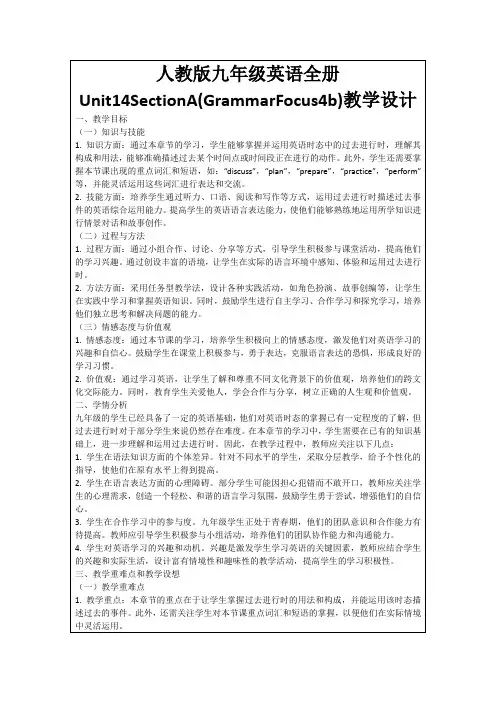
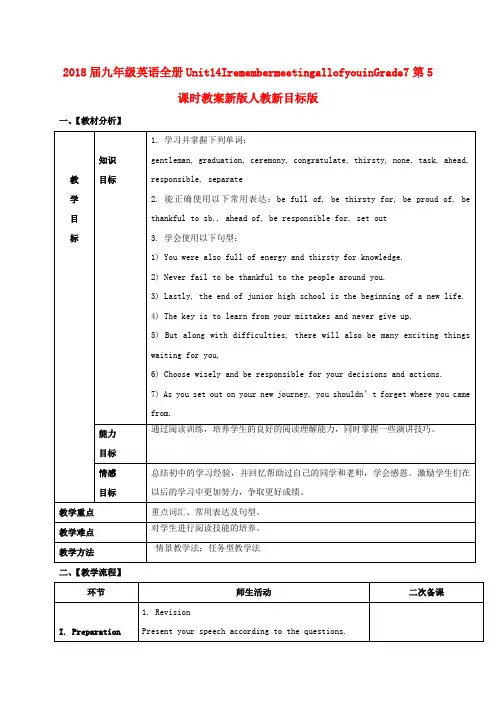
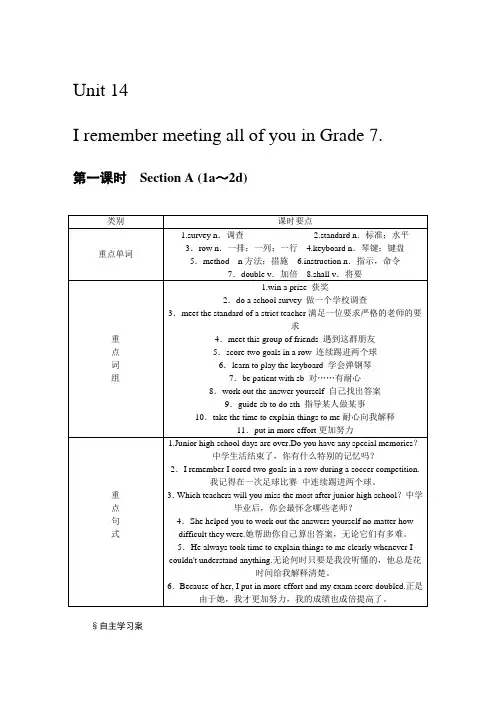
Unit 14I remember meeting all of you in Grade 7.第一课时Section A (1a~2d)类别课时要点重点单词1.survey n.调查 2.standard n.标准;水平3.row n.一排;一列;一行 4.keyboard n.琴键;键盘5.method n方法;措施 6.instruction n.指示,命令7.double v.加倍8.shall v.将要重点词组1.win a prize 获奖2.do a school survey 做一个学校调查3.meet the standard of a strict teacher满足一位要求严格的老师的要求4.meet this group of friends 遇到这群朋友5.score two goals in a row 连续踢进两个球6.learn to play the keyboard 学会弹钢琴7.be patient with sb 对……有耐心8.work out the answer yourself 自己找出答案9.guide sb to do sth 指导某人做某事10.take the time to explain things to me耐心向我解释11.put in more effort更加努力重点句式1.Junior high school days are over.Do you have any special memories?中学生活结束了,你有什么特别的记忆吗?2.I remember I cored two goals in a row during a soccer competition.我记得在一次足球比赛中连续踢进两个球。
3.Which teachers will you miss the most after junior high school?中学毕业后,你会最怀念哪些老师?4.She helped you to work out the answers yourself no matter how difficult they were.她帮助你自己算出答案,无论它们有多难。
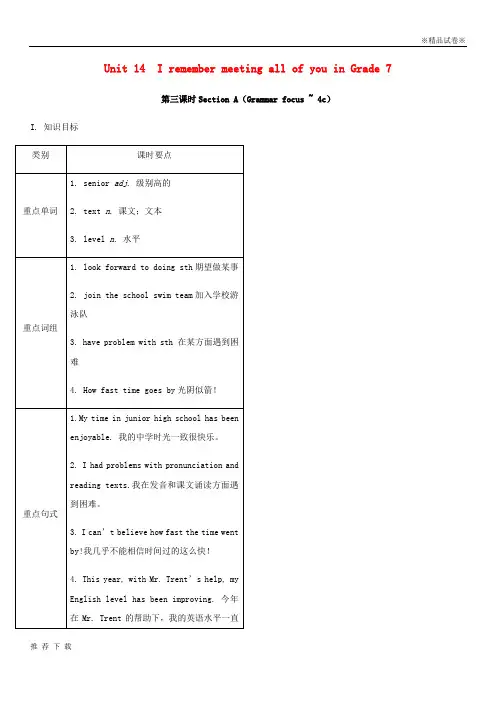
Unit 14 I remember meeting all of you in Grade 7第三课时Section A(Grammar focus ~ 4c)I. 知识目标II. 课堂环节§自主学习方案【新词自查】根据首字母提示完成单词。
1. The English teacher is leading the students to read the text and correcting their pronunciation.2. With the help of Mr. Wang. My English level has improved a lot.3. I like the girl who is kind and caring.4. The parents encourage the boy to be brave and overcome all kinds of difficulties alone.5. There is something wrong with the keyboard of the computer.§课堂导学方案Step 1情景导入(参考案例)Teacher: What’s your plan for your senior high school?Students: I will____.①take up a new hobby…② study harder..③make some new friends……环节说明:通过课前的一个师生问答互动引入新课的话题Step 2. 畅通Grammar Focus回顾语法重点.要求学生翻开课本P108,要求学生分角色问答并翻译表格中的句子。
复习各种句式所含的时态与句型结构及基本用法。
并能造出相仿的句子。
Step 3完成教材4a-4b的任务1.把4a所给的句子重新排序组成一个新的对话.给出5分钟的时限,然后请2位同学朗读对话,全班集体核对答案。
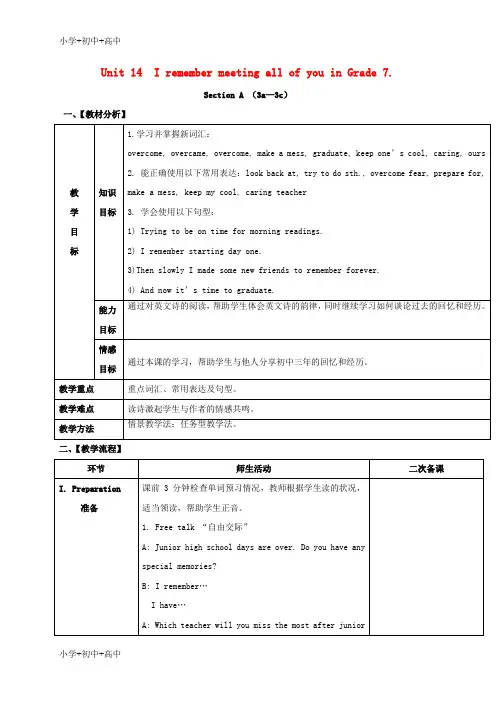
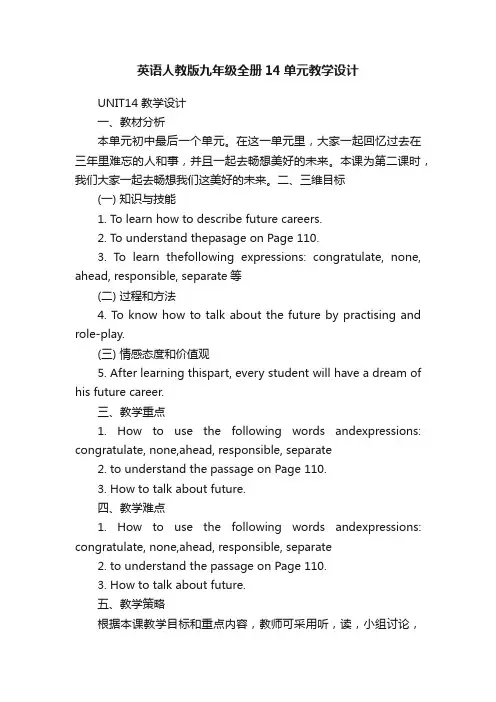
英语人教版九年级全册14单元教学设计UNIT14 教学设计一、教材分析本单元初中最后一个单元。
在这一单元里,大家一起回忆过去在三年里难忘的人和事,并且一起去畅想美好的未来。
本课为第二课时,我们大家一起去畅想我们这美好的未来。
二、三维目标(一) 知识与技能1. To learn how to describe future careers.2. To understand thepasage on Page 110.3. To learn thefollowing expressions: congratulate, none, ahead, responsible, separate等(二) 过程和方法4. To know how to talk about the future by practising and role-play.(三) 情感态度和价值观5. After learning thispart, every student will have a dream of his future career.三、教学重点1. How to use the following words andexpressions: congratulate, none,ahead, responsible, separate2. to understand the passage on Page 110.3. How to talk about future.四、教学难点1. How to use the following words andexpressions: congratulate, none,ahead, responsible, separate2. to understand the passage on Page 110.3. How to talk about future.五、教学策略根据本课教学目标和重点内容,教师可采用听,读,小组讨论,角色扮演等活动来引导学生进行学习。
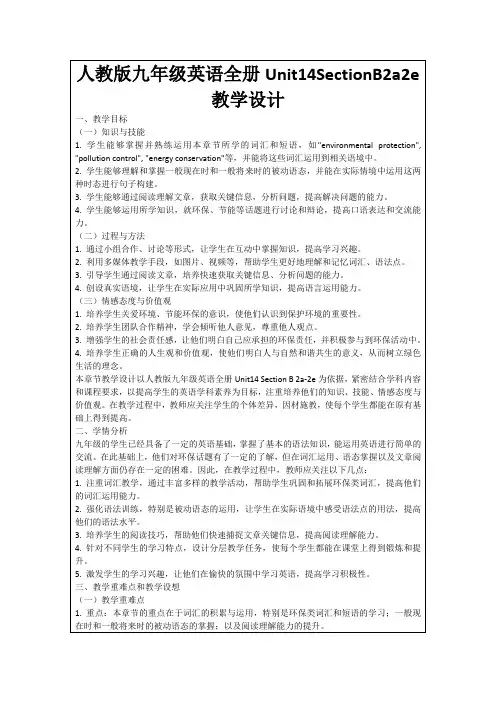


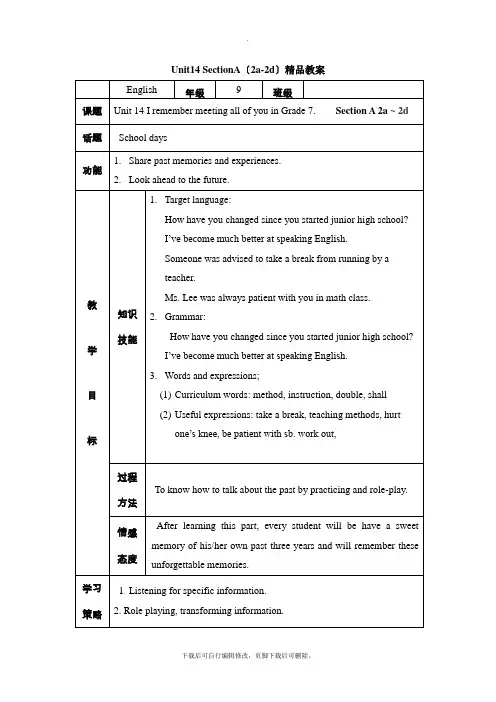
Unit 14 I remember meeting all of you in Grade7.话题Topic 在校时光School days功能Functions1.分享过去的回忆和经历Share past memories and experiences2.展望未来Look ahead to the future语法Grammar1.正确运用副词修饰比较级,动名词作主语的用法。
2.掌握状语从句的用法。
词汇和常用表达 Words & expressions 1.能正确使用下列词汇survey,standard,row,keyboard,method,instruction,double,shall,overcome,caring,ours,senior,text,level,degree,manager,gentleman,congratulate,thirsty,thankful,task,ahead,separate,wing2.能正确使用下列常用表达in a row,look back at,make a mess,keep one’s cool,senior high(school),goby,believe in,first of all,be thirsty for,ahead of,be responsible for,setout,separate from3.能认读下列词汇graduate,graduation,ceremony,lastly,responsible学习策略Strategies1.能够辨别不同文章的体裁,明确文章的写作目的,从而提高阅读效率。
2.通过寻找押韵词欣赏诗歌,谈论过去的回忆和经历,培养珍惜时光的意识。
3.能够运用宾语从句等重点句型描述校园时光,做毕业典礼上的演讲。
文化知识Culture 1.通过谈论过去的回忆和经历、校园时光和做毕业典礼上的演讲,培养学生珍惜过去的时光,从现在做起,追求美好未来的意识。
Unit14 SectionA(1a-2d)教案1.0Teaching Analysis教情分析1.1Teaching Objectives 教学目标1.1.1Language goals 语言目标1.1.1.1 Key Words and Chunks1.1.1.1.1 For applying: survey, standard, row, keyboard, instruction, double, shall, in a row remember doing sth.,win a prize,junior high school,be patient with sb.,work out ,no matter how,put in more effort1.1.1.1.2 For comprehending: meet the standards of,take a break from doing1.1.1.3 Sentence Structures1) Do you have any special memories?2) I remember losing my schoolbag in Grade 7.3) And we’re all going to miss this place.4) He gave us really clear instructions so that we’d be safe when playing sports.5) I have learned to play the keyboard in music class.1.1.1.4 Grammar Focus1)I remember losing my schoolbag in Grade 7.(remember加动词-ing形式表示记得做过某事)2)He always took time to explain things to me clearly whenever I couldn’t understand anything. (whenever 引导让步状语从句)3)At junior high school, I remember a friend helping me with a problem. (help的用法。
【精品同步】2018-2019学年年人教版九年级英语全册教案★Unit 14 I remember meeting all of you in Grade 7.【学习内容】I remember meeting all of you in Grade 7.Section A 1a-2d ( Period 1 )【学习目标】1.掌握重点单词和短语:survey,standard, row, keyboard, instruction, double, shall,win aprize, do a school survey, meet the standard of a strict teacher, meet this group of friends, scoretwo goals in a row, learn to play the keyboard ,be patient with sb, work out the answer yourself, guidesb to do sth, put in more effort等。
2.学习并掌握句型:1. Junior high school days are over. Do you have any special memories?2. I remember I cored two goals in a row during a soccer competition.3. Which teachers will you miss the most after junior high school?4. She helped you to work out the answers yourself no matter how difficult they were.5. He always took time to explain things to me clearly whenever I couldn’t understand anything.【自主学习案】Task 1. 翻译下列短语。
1.win a prize__________________2.do a school survey________________3.meet the standard of a strict teacher_____________4. meet this group of friends______________5.score two goals in a row___________________6. learn to play the keyboard__________________7.be patient with sb___________________ 8.work out the answer yourself__________________ 9.guide sb to do sth______________________ 10.put in more effort【合作学习案】Step 1. 知识梳理。
no matter,常与疑问代词或疑问副词一起构成连词词组引导让步状语从句,意为“不管…,无论…”,在运用时应注意以下几点:一.注意从句的时态由no matter what/who/where/when引导的从句往往用一般现在时或一般过去时。
如:No matter who you are, you must obey the rules. 无论你是谁,都应该遵守规则。
二、注意被修饰的名词、形容词以及副词的位置, no matter what/whose/which修饰名词时,该名词必须紧随其后; no matter how修饰形容词或副词时,该形容词或副词也必须紧跟其后。
如:No matter how hard he works, he find it difficult to make ends meet.无论他多么努力工作,却总是入不敷出。
三.注意“no matter+疑问词”结构与“疑问词+ever”在用法上的区别1. “no matter+疑问词”结构只能引导让步状语从句,这时可以和“疑问词+ever”互换。
如:No matter where he may be (=Wherever he may be), he will be happy. 他无论在什么地方都快乐。
2. 而“疑问词+ever”还可以引导名词性从句。
如:Give this book to whoever likes it. 谁喜欢这本书就给谁吧。
(这里不能用no matter who。
)3. whoever既可引导名词性从句,又有在从句中作主语、宾语、表语等;whomever也可引导名词性从句,但只能在从句中作宾语。
如:You may invite whomever you like.4. whatever表示“无论什么”,没有一定的范围限制;whichever表示“无论哪一个、无论哪些”,其后可接一个名词。
如:Eat whichever cake you like.【巩固训练案】根据汉语提示完成单词。
1. The students are doing a school (调查)about their eating hobbits.2. The workers are making the products carefully to meet the (标准)of the international.3. He father was so angry that he broke the (键盘)of his computer.4. This page has the clear (说明)of this kind of medicine.5. The man did the same job as us but was paid (双倍的).【学习内容】I remember meeting all of you in Grade 7. Section A 3a-3c ( Period 2 )【学习目标】1.掌握重点单词和短语overcome,graduate,caring ,ours, look back at ,pride of overcomingfear ,make a great big mess ,keep my cool ,try to be on time for morning reading等。
2.学习句型:1. Looking back at these past three years, I remember many things.2. And now it’s time to graduate, we will leave our lovely school.3. I will miss the school trees and flowers and our kind and caring teachers.【自主学习案】Task 1. 翻译下面的短语。
1.look back at___________________2.pride of overcoming fear__________________3.make a great big mess________________4.keep my cool__________________5.try to be on time for morning reading_____________________【合作学习案】 Step 1. 知识梳理。
1.caring adj. 体贴人的如:I will miss the school trees and flowers and our kind and caring teachers.我会怀念学校的树木花草以及我们善良,体贴的老师。
【横向辐射】care的用法1. 用作名词,表示“注意”“小心”“关心”等,均为不可数名词。
如:Care is needed when crossing the road. 过马路时要小心。
2.用作动词,注意以下用法:(1) 后接不定式,表示“愿意”“喜欢”“想要”,通常用于否定句、疑问句或条件句等。
如:She did not care to go with them. 她不想和他们一道去。
(2) 后接从句,表示“在乎”“在意”等,多用于否定句或疑问句,偶尔也用于肯定句。
如:I didn’t care which of us won. 我不介意我们之间哪一位获胜。
3. 用于 care about(1) 表示“在乎”“介意”。
如:The only thing he cares about is money. 他只在乎钱。
(2) 表示“对…感兴趣”。
如:I don’t care about your opinion. 你的意见我不感兴趣。
(3) 表示“关心”。
如: Each of us had to care about the other. 我们人人都必须互相关心。
(4) 表示“为…担心或担忧”。
如:Don’t you care about this country’s future? 难道你不为国家前途担忧吗?4. 用于 care for(1) 表示“喜欢”,通常用于否定句或疑问句。
如:I don’t care for standing in queues. 我不喜欢排队。
有时还可接不定式的复合结构。
如:I wouldn’t care for that man to be my doctor. 我不愿意让那个人当我的医生。
(2) 表示“照看”“照顾”(可用于各种句型)。
如:The mother cared for the sick child day and night. 母亲日夜照料着生病的孩子。
(3)表示“关心”“爱护”,这是一种比较正式的用法。
如:We must care for each other and help each other. 我们要互相关心,互相帮助。
5.口语中说couldn’t care less,其意为“根本不在乎”。
如:They couldn’t care less. 他们根本不在乎。
【巩固训练案】根据汉语提示完成单词。
1. I am sure you can (克服)all kinds of difficulties and enter a good university.2. The disabled boy worked hard and (毕业)from the Tising Hua university.3. Mr. Wang is one of the most popular teachers because he is knowledgeable and (体贴人的)4. No. 6 school team has better players than (我们的)5. As soon as their parents left , the children made the house a .(一团糟)【学习内容】I remember meeting all of you in Grade 7.Section A(Grammar focus ~ 4c)【学习目标】1.掌握重点单词和短语 senior ,text ,level, look forward to doing sth, join the school swim team, have problem with sth , How fast time goes by等。